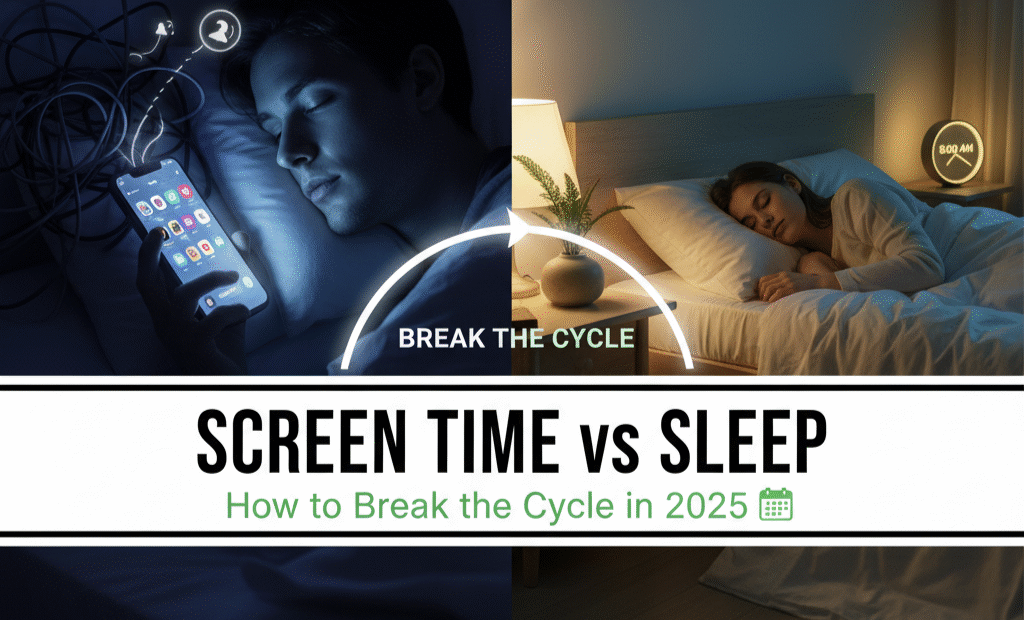In today’s digital age, screens dominate our lives. Smartphones, tablets, laptops, and TVs keep us connected, entertained, and productive—but they can also wreak havoc on our sleep. Research shows that excessive screen time, especially before bed, disrupts circadian rhythms, reduces melatonin production, and contributes to poor sleep quality. Understanding the relationship between screen time and sleep is crucial to improving rest, mental health, and overall well-being in 2025.
How Screen Time Affects Sleep
Blue light emitted from screens is a primary factor that interferes with sleep. It tricks your brain into thinking it’s daytime, suppressing melatonin, the hormone responsible for regulating sleep cycles. The result? Difficulty falling asleep, shorter sleep duration, and less restorative rest.
1. Delayed Sleep Onset
Scrolling social media or binge-watching shows late at night delays the body’s natural readiness for sleep. This can make you feel groggy the next day, even if you spend enough hours in bed.
2. Reduced Sleep Quality
High screen exposure before bed leads to fragmented sleep. You may wake up more frequently and spend less time in deep, restorative sleep stages.
3. Increased Stress and Anxiety
Late-night emails, news, and social media interactions can elevate cortisol levels, making it harder to relax and fall asleep.
Why Breaking the Screen-Sleep Cycle Matters
Poor sleep caused by excessive screen time affects physical, mental, and emotional health. Some consequences include:
- Increased risk of obesity and metabolic disorders.
- Decreased cognitive function, focus, and productivity.
- Weakened immune system.
- Higher levels of anxiety and irritability.
Practical Strategies to Reduce Screen Time Before Bed
1. Set a Digital Curfew
Designate a time, ideally 1 hour before bedtime, to turn off all screens. Use this time to wind down with non-digital activities like reading, journaling, or stretching.
2. Use Blue Light Filters
Most devices now have night mode or blue light filters. While not a complete solution, they reduce the impact of screen light on melatonin production.
3. Limit Notifications
Constant pings encourage late-night screen checking. Silence non-essential notifications or enable “Do Not Disturb” mode in the evening.
4. Create a Bedtime Routine
Establish relaxing pre-sleep rituals that signal your brain it’s time to wind down. This could include meditation, light reading, gentle yoga, or listening to calming music.
5. Keep Screens Out of the Bedroom
Charge your phone in another room and avoid laptops or TVs in bed. Your bedroom should be a sanctuary for rest, not digital engagement.
Balancing Screen Time During the Day
Reducing evening screen exposure is only part of the solution. Managing overall screen time helps your eyes, brain, and body maintain a healthy rhythm.
- Take frequent breaks from your computer using the 20-20-20 rule (every 20 minutes, look 20 feet away for 20 seconds).
- Schedule focused, offline time for tasks requiring deep concentration.
- Engage in outdoor activities during the day to increase natural light exposure, which helps regulate circadian rhythm.
Mindful Screen Use and Sleep Hygiene
Combining mindful screen habits with good sleep hygiene maximizes the benefits. Key tips include:
- Maintain a consistent sleep schedule, even on weekends.
- Create a relaxing bedroom environment—cool, dark, and quiet.
- Practice breathing exercises or meditation before bed.
- Track sleep patterns using apps or wearable devices to identify issues and improve routines.
Conclusion
In 2025, screens are here to stay, but they don’t have to disrupt your sleep. By understanding the link between screen time and sleep, setting boundaries, and practicing mindful habits, you can break the cycle of digital overexposure and poor rest. Small daily changes, such as a digital curfew, blue light filters, and a consistent bedtime routine, can significantly improve sleep quality, mental clarity, and overall health.
Remember: your sleep is as important as your work or entertainment. Prioritize it, limit screens before bed, and enjoy the benefits of deep, restorative rest.









